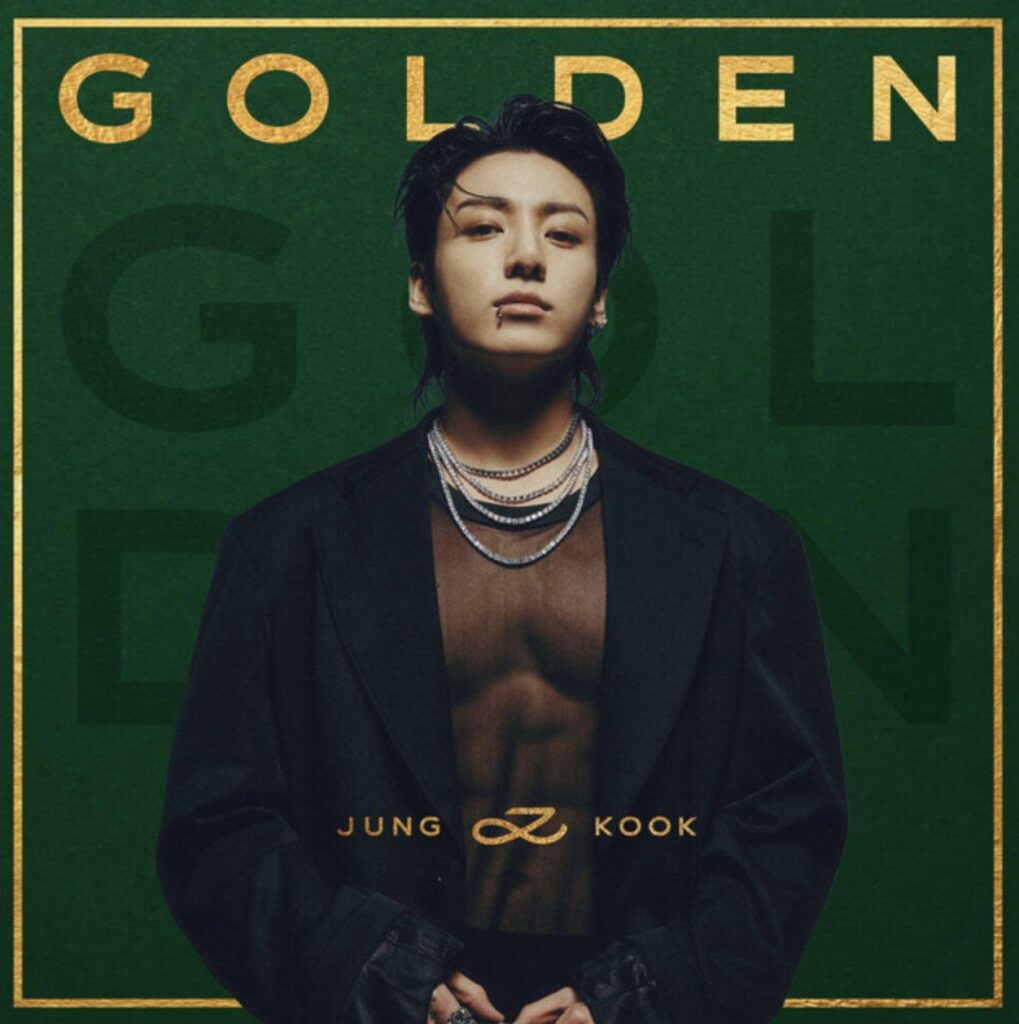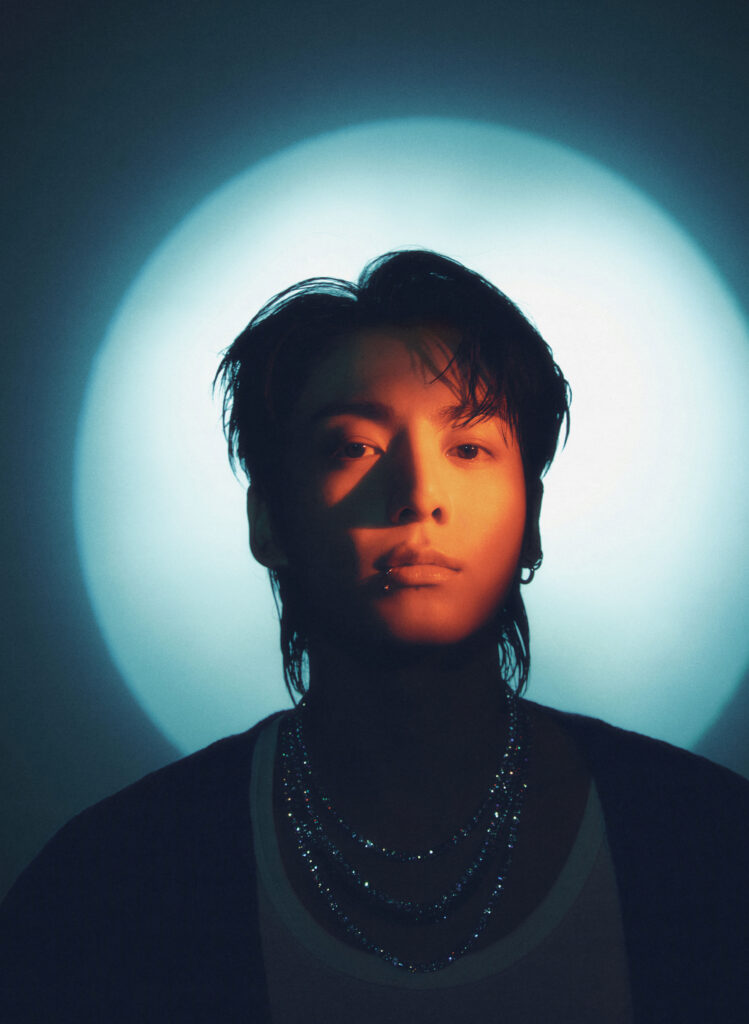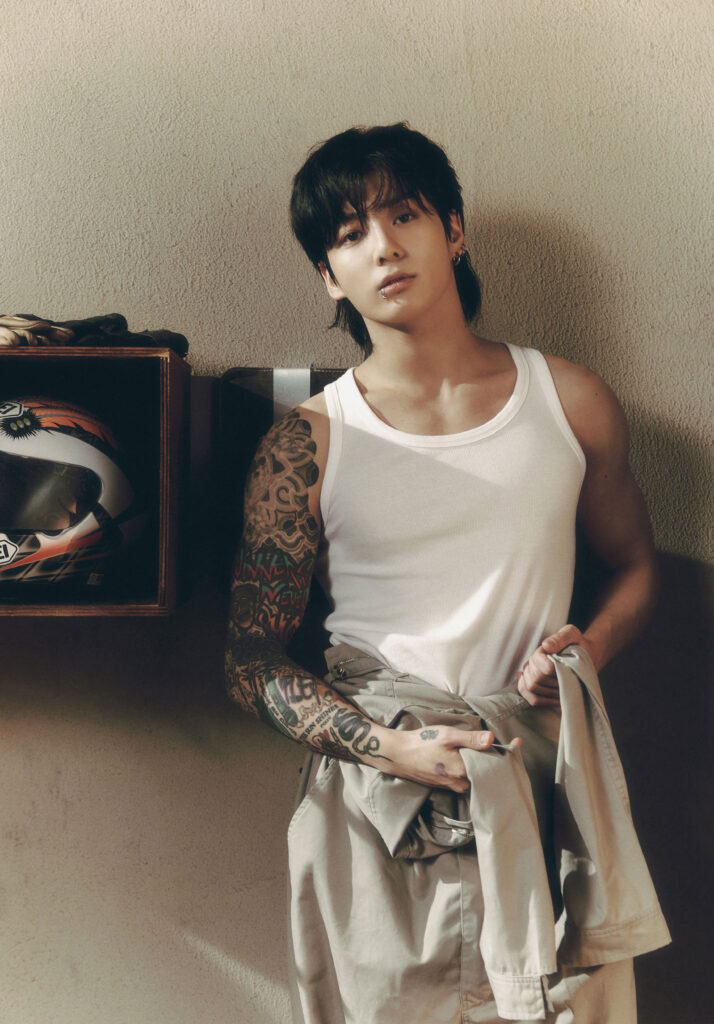
Following the release of singles “Seven” and “3D,” Jungkook is back with his solo debut, a full English-language album called Golden. The name draws from his nickname “Golden Maknae,” which refers to his natural talents in many areas: drawing, painting, nearly all sports, video production, and of course, singing and dancing. The title Golden aptly reflects his vocal abilities and his adaptability in various pop subgenres.
As Jungkook is the second to last member of BTS to release a solo album, listeners (including this writer) may have developed expectations of BTS members’ solo projects based on previous work. So it is worth noting what this album is not: it is neither an introspective exploration of a period in his life, nor an examination of his identity as an artist. It is not an album that displays his songwriting ability (though he has previously proven that), or that particularly cares about lyrical depth.
Over the past few months, Jungkook has been clear about his ambitions and his thought process about this album. He has expressed his desire to become a major pop star, and is now prioritizing vocals and performance over songwriting and telling his own story. He stated in an interview with British GQ, “I just wanted to try diverse genres and styles and work on my own sound. As of now, that is still my goal. I want to work on different stories.”
With covers of artists like Tori Kelly, Justin Bieber, and Adam Levine, and with collaborations with Charlie Puth and The Kid Laroi, among others, Jungkook has long admired pop music from the American music industry. Golden, particularly in its first half, feels like a collection of Western pop sounds from past decades. “Seven” recalls Craig David and “3D” 2000s-era Justin Timberlake. Meanwhile, the title track “Standing Next to You,” a retro funk song, evokes Michael Jackson with a bass line reminiscent of Queen’s “Another One Bites the Dust.”
Brassy and grand, “Standing Next to You” makes a perfect title track to highlight Jungkook’s vocals, dance, and stage presence. The song is a showstopper that exhibits Jungkook’s vocal agility, particularly in his seemingly effortless transition to his falsetto with the line “Afterglow, leave ya body golden like the sun and the moon.” The second half of the song is empty of vocals to make room for dance breaks, but the horn and later bass and drum sections bring enough theatricality to sustain interest. “Standing Next to You” is pop excellence that is made to be performed, in a way that only Jungkook can.
Callbacks to BTS are also present in the title track and other songs. “Standing Next to You” includes the line “deep like DNA” in its chorus, while “Too Sad to Dance” parallels “Permission to Dance,” particularly in the “walk that walk” and “talk that talk” references in the final verse. It could have been interesting for the Golden producers to include musical references to BTS songs alongside the other pop influences, but that does not occur here.

Golden is hardly a concept album, but there is a loose story and a logical progression of songs, with the first half of the album depicting a relationship, and the second half the breakup and its aftermath. “3D” and “Seven” fit appropriately enough as the first and third tracks of the album, expressing the intense desire for one’s partner at the beginning of a relationship. “3D” in particular works better in this context, though Jack Harlow’s verse is still jarring in its flow and questionable in its lyrics.
In the first half of the album, Jungkook utilizes a variety of sounds to depict falling in love. “Closer to You,” a reggaeton-inspired track featuring Major Lazer, brings a more mature seductiveness compared to the cheeky horniness of the pre-release singles. The production on Jungkook’s airy vocals makes them sound far away, but lures in the listener to want to close the distance. He later takes a more rhythmic approach to his vocal performance, matching the house beats during the second verse. “Please Don’t Change” has a similar tropical club feel, but is one of the less memorable tracks due to its repetitiveness and short running length. The catchiest b-side on the album is probably “Yes or No,” co-written by Ed Sheeran. The guitar-driven pop song is simple and earnest, with a strong melodic hook: “Are we falling in love? Say yes or no, yes or no, yes or no.”
The songs that form the breakup section, however, best showcase Jungkook’s emotive abilities as a singer. “Hate You”, with lyric credits to Shawn Mendes, among others, reveals Jungkook at his most vulnerable. His voice is breathy and delicate, sometimes at a near whisper as he says, “Hating you’s the only way it doesn’t hurt.” He also elongates the syllables in lines like “We weren’t perfect, but we came close / Until I put all of our pain under the microscope,” allowing his voice to tremble. During the chorus and bridge, the track movingly layers his vocals, before returning to the simplicity of Jungkook singing over piano during the outro, emphasizing his isolation.

“Somebody” surprises listeners, with Jungkook utilizing his full vocal range. His lower register at the beginning (which is underutilized in BTS’ music), might lead one to think the song has a featured singer, especially with the vocal processing in the first verse. As with other songs on the album, Jungkook shifts from his lower to upper register with ease. The song employs pleasant house beats that belie the bitterness of the chorus’ line “I hope you know that somebody ain’t me.” His angst further comes out in lines like “there’s so much damage going through the motions makes.”
“Shot Glass of Tears” is another standout song of the album. Starting off with Jungkook’s voice reverberating over piano chords, the song swells up as it progresses, becoming lush and nearly anthemic. It is the sort of song that would bring out the lighters at concerts. One could also easily imagine a version with a final, dramatic chorus, but the song does not offer that catharsis. Instead, in the last few lines, most of the instruments fade away, and the song ends where it begins, with the lines:
She the life of the party
Forty-two in her body
She got some dangerous hobbies
Like chasin’ after the sun, and makin’ me fall in love
“Seven” (Clean Version) follows the pattern of BigHit acts placing alternate versions of their top singles at the end of the album, seemingly disconnected from the overall concept. The song resonates differently, however, when immediately following “Shot Glass of Tears.” The latter song repeats, “Tell me am I ever going to feel again?” and “Seven” seems to provide a response — yes. The album is ordered in a thoughtful way that connects the diverse pop sounds together.
Jungkook’s goals for himself are modest in some respects and highly ambitious in others, aiming for pop superstardom through leveling up as a singer and performer. Through Golden, he has certainly accomplished showing us some of the best, most complex vocal and dance performances of his career. People could argue that he has yet to establish his own identity apart from his influences, and they wouldn’t necessarily be wrong. Nevertheless, it is hard to imagine anyone else this year being as satisfying of a pop entertainer as Jungkook with Golden.
(British GQ, SoundCloud, YouTube[1][2][3][4]. Lyrics via Genius [1][2][3][4]. Images via HYBE).
0 Comments